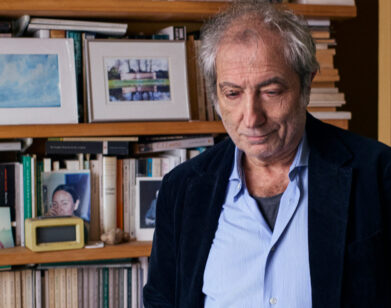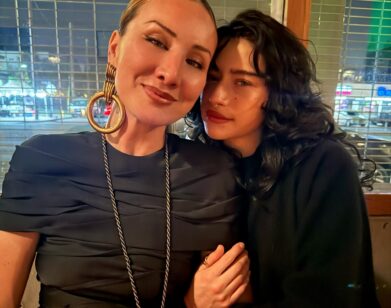The Revolutionary Katy Simpson Smith

ABOVE: KATY SIMPSON SMITH. PHOTO COURTESY OF ELISE SMITH/HARPERCOLLINS
Katy Simpson Smith’s debut novel The Story of Land And Sea (Harper) is an intense, moody musing on family, loss, and love. Set in a small coastal town in North Carolina after the American Revolution has both rejuvenated and raised havoc on the American people, Tabitha, a 10-year-old girl, plays in the tides of the ocean entranced by the vast natural world around her. But she is more vaguely aware of the deep family conflicts that are part of her past. Simpson Smith lyrically but firmly draws us still back in time to reveal the lives that surround her character. The intense, tortured love affair of Tabitha’s parents. Her mother’s slave Moll, whose own life is a rich push and pull between slavery and defiance. Tabitha’s devout grandfather, whose world is a purgatory of doubt mixed with devotion. Transporting, tragic, both tranquil and turbulent, Simpson Smith captures life in any time period—but especially this era of newfound freedoms—with grace and powerful prose. We spoke with Simpson Smith about seductive geography, the pain of living, loving ghosts, revolution, and independence.
ROYAL YOUNG: What is the push and pull between land and sea and the wildness you describe so well?
KATY SIMPSON SMITH: Geography is incredibly important to shaping our personalities. That goes for the 21st century, too. For this period of time, for Tabitha in particular, what living on the edge of land and sea represents is her ability to have a very open future. She imagines a very wide range of possibilities for herself.
YOUNG: Is there a danger in being too seduced by the openness of your landscape?
SIMPSON SMITH: Yeah for me at least, I’m completely seduced by landscapes. Sometimes to the detriment of human relationships.
YOUNG: [laughs] Awesome. Well, the landscapes are often more lasting, right?
SIMPSON SMITH: Right.
YOUNG: You have a line about the pain of the living. All the characters live with a measure of pain. Do you think pain is a constant part of being alive? If you are alive, you are in pain?
SIMPSON SMITH: I do. It sounds like a really pessimistic outlook on life, but I consider myself an optimist. I think the ways we come out of that pain and fight against it are how we create beautiful things in our lives. That’s what makes us human. It’s easy to see in fiction where everything seems heightened, but there are so many little pains that we get over every day, we go to the grocery store, we are with our loved ones. There’s a positive message overall.
YOUNG: I’m with you. I believe in pain but am an optimist. Pain is okay. We view it as so negative—something to be pushed down, avoided, and denied—but just opening yourself to it kind of lessens it.
SIMPSON SMITH: Yeah. Pain is okay. [laughs]
YOUNG: [laughs] It is. How much loss can we take?
SIMPSON SMITH: It depends on the person. There are people who can withstand incredible amounts of loss. And then there are people where just one small loss can send them reeling. It’s not a judgment on people’s characters. You learn a lot about people through loss, and that’s why fiction appealed to me.
YOUNG: Could you elaborate a bit on loss in fiction?
SIMPSON SMITH: In our own lives, we really only have a few opportunities to see how a person deals with loss. We only have our own experiences, and to me that feels like not enough. Fiction is a way for me to imagine myself in other people’s bodies. To see what I would do if I was a 70-year-old grandfather or a woman in love.
YOUNG: What specifically about exploring loss in other people?
SIMPSON SMITH: [laughs] This is like a therapy session.
YOUNG: [laughs] Both my parents are shrinks. I can’t get away from it.
SIMPSON SMITH: No, it’s great. It’s free therapy. It seems like loss is the lowest point of human experience, because it’s completely out of our control. Something is taken away from us, often violently. So many people deal with loss through fate or god, and that is not always a satisfying answer to me. I’m as interested in how the loss happened as in how people rationalize it.
YOUNG: It’s extreme. Loss, love, war—you’re interested in people under extreme conditions. We are more and more removed from the life your characters lived in that time period.
SIMPSON SMITH: Yes, it was more sort of elemental.
YOUNG: I want to talk about loving ghosts or people we’ve lost, and how much of our lives we should devote to that.
SIMPSON SMITH: Loving ghosts can either be a way to get out of living in the present and the people still around you, or the flip side: holding on to that love is what keeps people buoyed and living themselves. It’s a very beautiful emotion. In my mind, you can love people as long as you want.
YOUNG: You have a line: “Women are the ones who die.”
SIMPSON SMITH: That is tied particularly to the late 18th century when the book takes place. Women were dying in childbirth at remarkable rates. There was a sense that being a woman and than becoming a mother was a very dangerous passage. They left men behind who were very ill equipped to be fathers, and that interests me, seeing people take on huge responsibilities they are unprepared for.
YOUNG: What drew you to the time period?
SIMPSON SMITH: I did graduate work in history before turning to fiction. The American Revolution was a time I was always very interested in. That is the beginning of so many things about our culture. It’s when we asked, “Should we keep slavery or not?,” and they were like, “Yeah, slavery is fine.” It happens in the midst of this language about freedom, liberty, and resisting the tyrant. It’s very complex.
YOUNG: I want to talk to you about defiance.
SIMPSON SMITH: Defiance for me is very wrapped up in independence. A lot of these characters have to be independent because of their circumstances. The only way to assert one self is to be defiant against the social pressures of the time. To say, I am a human, I am an individual, this is me apart from my society. I feel that way in my own life, that need to define myself in opposition to the world around me.
YOUNG: It makes me like them better, personally. I definitely have huge authority issues and probably confuse independence and defiance. Do you think you can be independent without being defiant?
SIMPSON SMITH: Absolutely.
YOUNG: But it’s like the boring kind of independence. [laughs]
SIMPSON SMITH: [laughs] It’s run-of-the-mill, everyday independence.
THE STORY OF LAND AND SEA IS OUT TOMORROW, AUGUST 26.






